Have you ever noticed certain patterns in your family that have made you think, “Maybe my family is dysfunctional”? This post delves deep into the signs your family is dysfunctional and the unspoken rules of dysfunctional families. Let’s find out more about how to tell if your family is dysfunctional or not.
Key Points
- All families, as with all social systems, have some level of dysfunction. It does not mean they are all unhealthy or abusive, but some are.
- Growing up in unhealthy environments can set children up for unhealthy or unsafe relationships down the line.
- Developing and maintaining boundaries can help decrease trauma symptoms that arise later in adulthood.
Perhaps you are reading this because you worry your family is dysfunctional. Or maybe you know it is, and you are looking for further information about how and why, or something to confirm what you already know.
The truth is that all families have dysfunction, just on varying levels. Like many things, dysfunction runs on a spectrum.
But a family with a healthy or safe level of dysfunction is one that recognizes that it is imperfect, and whose members are open to learning and supporting one another rather than blaming or finding fault.
Families with unhealthy levels of dysfunction are the ones that run the risk of causing harm to its developing children due to blame, chaos, lack of boundaries, and poor communication.
Related: 18 Signs of A Dysfunctional Family and How To Deal
This is often when one or more of its caregivers has an untreated mental illness or personality or substance use disorder, or when some sort of trauma or impairment impacted the adult(s)’s ability to care for others effectively.
Following are 10 of the major unspoken rules of dysfunctional families that I’ve noticed in my practice and from personal experience.
10 Unspoken Rules of Dysfunctional Families
1. We don’t talk about the imperfections.
While a “normal” dysfunctional family will joke or laugh about their dysfunction, or even be willing to have conversations about how to work together to improve, unhealthy families have an unspoken rule not to acknowledge the dysfunction or imperfections.
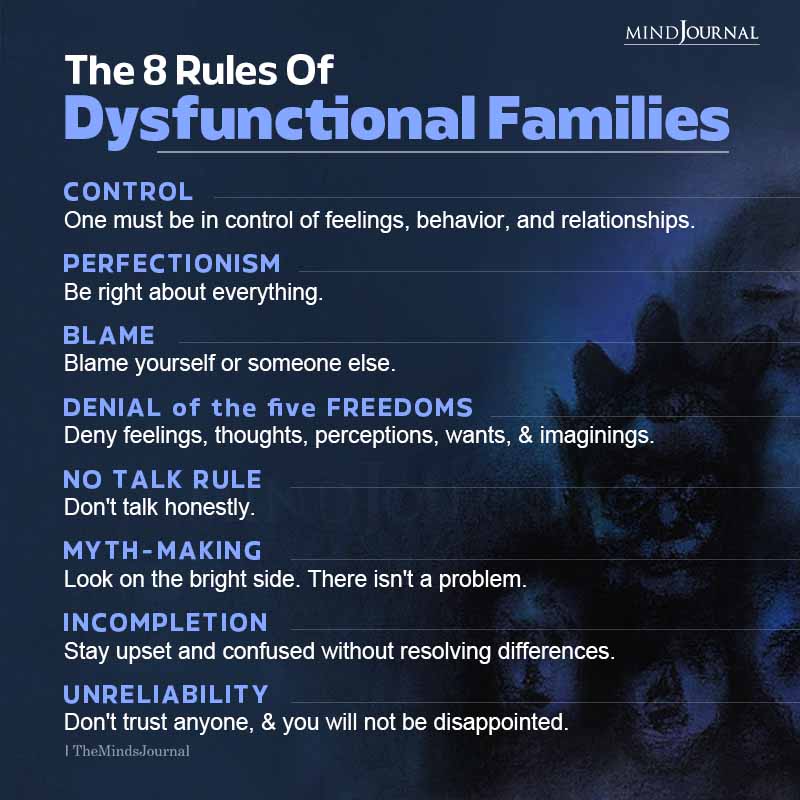
2. Communication can feel like war.
Unhealthy families, particularly ones in which one or more caregivers have elements of a personality disorder such as narcissism or borderline personality, are riddled with poor communication.
Triangulation, in which members of the family are pitted against each other; gaslighting, in which people’s realities are denied; and other passive-aggressive or abusive practices are common.
Communication can feel so scary, intimidating, and confusing that survivors are often left feeling exhausted and traumatized just from trying to make sense of their situation.
3. Punishment can often feel like revenge, instead of a normal response to wrongdoing.
Children in unhealthy families, particularly ones in which there are elements of a personality disorder, are often “punished” as a form of revenge for angering or disrupting the unhealthy parent, as opposed to the normal punishments one would expect for a child, such as being grounded for lying or breaking curfew.
In these families, a child is punished for daring to say that they are upset with something a parent has done, having a different opinion, or breaking another unspoken rule.
Related: What Is A Dysfunctional Family? Identifying Signs and Types Of Toxic Families
4. Blackmail is acceptable.
Feelings can, and will, be used against you. Due to the unhealthy dynamics, vulnerabilities will be exploited to further control.
One of my clients remembers sharing with her mother that she felt worried about something the other parent would do. Her mother shared this information with the other parent as punishment for a recent mishap. It was done to achieve power, control, and intimidation.
5. The adult’s feelings/emotional needs are more important.
This is not just about Mommy putting on yet another movie so she can have her alone time.
This is when the parent or caregiver’s emotional needs are more important, meaning that if they are upset, it takes precedence over whatever else is going on. The child’s emotional needs have to wait if they get attended to at all.
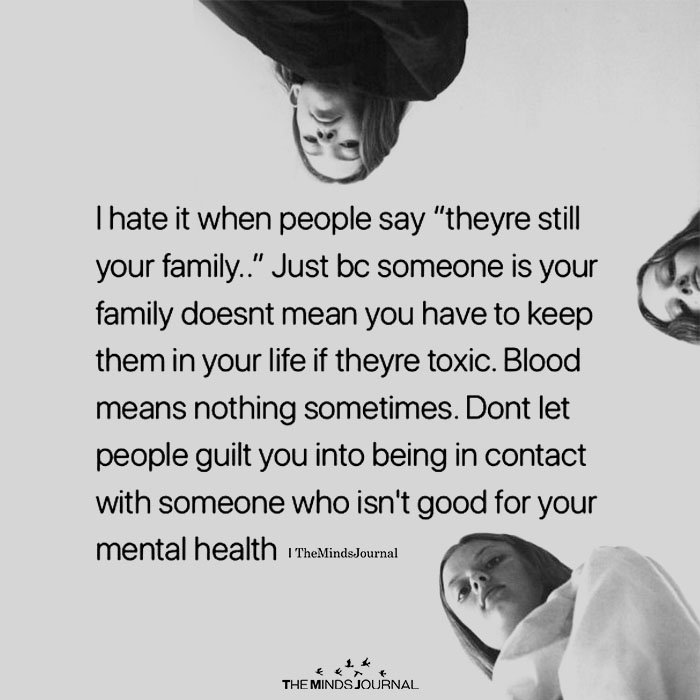
6. You can be angry or sad, just not ever at us.
When the child is upset, they are never allowed to be upset at the parent, no matter what happened. While this is normalized in some generations or cultures, it is unhealthy to not allow children to express their feelings.
We should encourage them to do so respectfully, so they can learn how.
7. Roles are often switched.
From a surrogate spouse, which is common in dysfunctional families, to children having to be the emotional caretakers of their parents, it is common for family roles to be switched.
Many survivors report being parentified, yet at the same time emotionally neglected.
8. Others aren’t like us, so we can’t get too close.
Survivors of unhealthy families often report feeling “different” from others.
Some of this is due to feeling like others will not understand their history, but it is also due to the constant messages that unhealthy caregivers send about people outside of the family: that they can’t be trusted or “let in.”
9. We thrive on drama or chaos.
There has to always be someone we are mad at or something that is wrong or causing stress.
It can be someone in the family or extended family, a neighbor, a teacher, a family friend, or even the hairdresser. And there will never be any insight into what we did to contribute to the conflict, as it is never our fault.
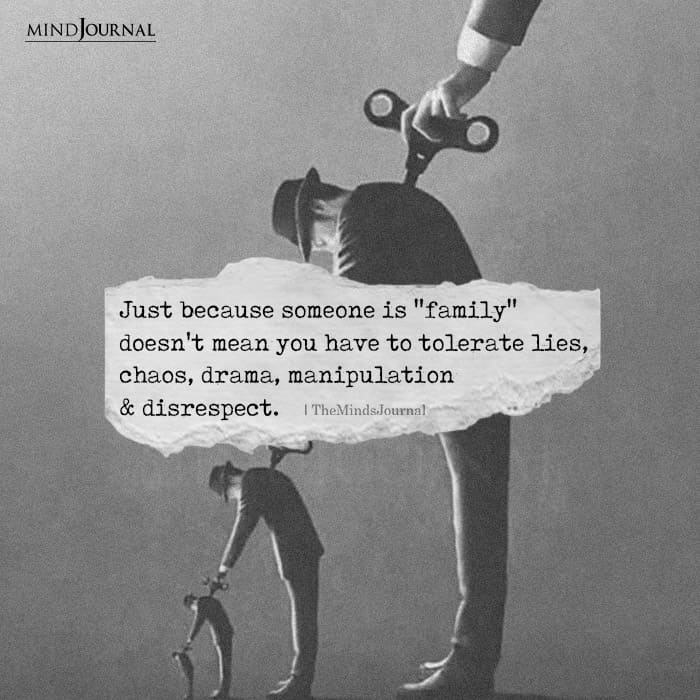
10. Boundaries are just suggestions.
Boundaries, such as physical, emotional, and spiritual, are essential for all of us. In healthy families, those boundaries are encouraged and respected.
However, in unhealthy families, they are not. Diaries are read, and then the information is used against the writer.
Children don’t have the right to refuse hugs, unwanted touching, or even unwanted conversations. Privacy is not allowed, and children are made fun of for requesting it, as in, “What are you doing in there?” or “Why do you need a lock on the door?”
Many survivors find support and healing through acknowledging their history and working to develop boundaries so as to not repeat these patterns.
Related: How Growing Up In A Dysfunctional Family Affects Your Dating Life
Please do not hesitate to seek support or professional help if you are struggling to deal with a dysfunctional or traumatic family structure or are working to address any resulting trauma.
References:
Al Ubaidi BA (2017) Cost of Growing up in Dysfunctional Family. J Fam Med Dis Prev 3:059. doi.org/10.23937/2469-5793/1510059
Written By Kaytee Gillis Originally Appeared On Psychology Today
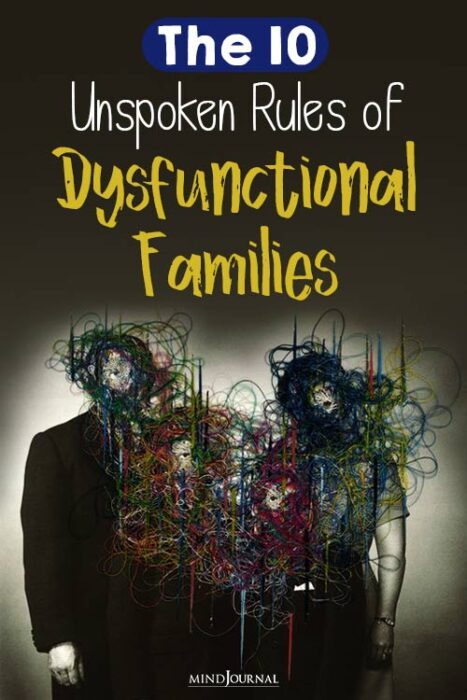
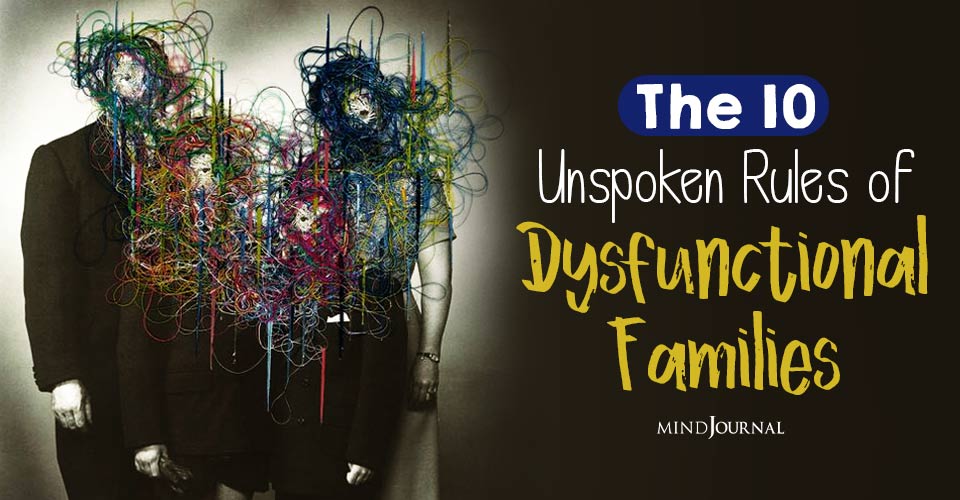







Leave a Reply
You must be logged in to post a comment.